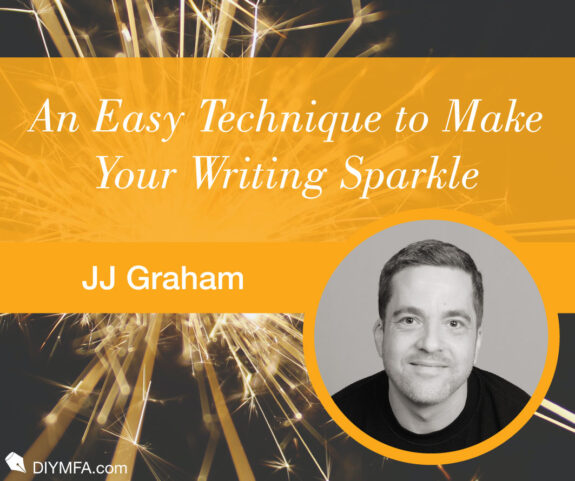The original name of this article was “Try This One Simple Hack to Better Writing,” but it would have angered the search engine algorithms that determine where things end up in their search results. Clickbait-y titles like that (rightly) make websites and articles appear dead last. Case in point: when was the last time you saw something titled “You Won’t Believe Why He Wore His Clothes Inside Out For a Year” at the top of a Google search results list? Yep, never.
Instead, I’m going to assure you right here, now that we’re deeper into this article, that the tip I’m about to share may propel your writing forward by light years. No, seriously. I discovered this technique a few years ago, and I’m still kind of shocked at how easy it is to use and how it makes my writing so much stronger.
But before we dive in, try to read the following without falling asleep (or scrolling to another DIY MFA article out of sheer boredom):
Sam heard a faint tapping at the window as he was grading essays. He watched the red pen in his hand stop. He couldn’t believe the heavy rain had already started. He realized he had been working for three solid hours. He had watched the morning news earlier in the day that said the storms wouldn’t come in until late afternoon.
With a sigh, he pinched the bridge of his nose to stop the ache he felt behind his eyes. He decided to get another cup of coffee from the kitchen.
He looked around the small three-foot-by-three-foot space and realized all the coffee cups he owned were in the porcelain kitchen sink. It seemed he’d have to wash one. That was when he noticed the small footprints on the counter where he’d spilled flour the night before.
He wondered if the tiny people were back.
Poor Sam. He lives a lonely life–that’s for sure. Or maybe his partner has been away for a week visiting family and Sam will have to rush to clean up right before they get home, all while fretting about the return of the tiny people. I dunno. Sam would have to tell you that.
But all joking aside, there’s something very off about the way the passage is written. Besides being heavy on telling versus showing, the writing removes the reader from what’s happening on the page. Don’t get me wrong–sometimes it’s good to be stuck in a character’s head, like when you’re diving into deep POV, but not everything should be seen through the eyes of a character.
Now look at the same passage rewritten:
A faint tapping at the window broke Sam’s concentration. He stilled, the red pen in his hand finally coming to rest. Was the heavy rain already starting? Surely it was too early—the morning news had said the thunderstorms wouldn’t sweep over the city until late afternoon.
The time on his watch confirmed he’d been grading essays for three solid hours. With a sigh, he pinched the bridge of his nose to stop the ache behind his eyes. Another cup of coffee might help.
The cramped three-foot-by-three-foot kitchen was just large enough to make lonely meals for one. Under the harsh glare of a naked lightbulb, flies buzzed around dirty dishes languishing in the chipped porcelain sink. Resigned to washing a mug, Sam began to squeeze dish soap into the sink when he froze. Small footprints dotted the counter where he’d spilled flour the night before. His heart racing, Sam bit his fist to stop the scream lodged in his throat.
The tiny people were back.
Doesn’t this feel more immediate? Each sentence propels you to the next. That certainly doesn’t happen in the first (boring) passage. And what a lack of sentence variation in the first passage; almost every sentence starts with the same structure: Subject + Verb. It’s a total snoozefest.
So, how did I rewrite the passage to make it sparkle? I got rid of the bolded filter words and rewrote those sentences using tighter language. By choosing better verbs and more precise wording, the sentences practically rewrote themselves.
What is a filter word?
Certain words (usually verbs) increase narrative distance and make the reader feel detached from the story. Typically, these words filter the reader’s experience through the characters and can be found near the beginning of sentences.
Here’s a handy list of common filter words:
- Believed
- Can/Could
- Decided
- Experienced
- Felt
- Heard
- Knew
- Looked
- Noticed
- Realized
- Saw
- Seemed
- Sounded
- Thought
- Watched
- Wondered
Too many of these filter words lead to readers yawning and DNFing a book. Though using them isn’t the end of the world (kind of like adverbs), a few filter words go a long way. Save them for when your characters truly watch or hear or [insert filter word] something.
Of course, as you’re writing your first draft, don’t stress too hard about filter words. Just get the story on paper. Much later, once you are at the line-level editing stage, highlight all these nuggets of potential awesomeness to pinpoint where to level up your writing.
How to target filter words in a manuscript
In Word, follow the directions here to find and highlight each filter word. It’s some work but worth the effort, I promise!
Scrivener makes it easy to highlight multiple words at once. Go to Edit > Find > Project Search. In the search bar, paste the following (change to present tense if applicable):
(Believed|Can|Could|Decided|Experienced|Felt|Heard|Knew|Looked|Noticed|Realized|Saw|Seemed|Sounded|Thought|Watched|Wondered)
Then click on the magnifying glass icon in the search bar and choose Search In: All and Operator: RegEx from the drop-down menu. Boom! They’re all highlighted for you.
And there you have it. This one simple trick has the potential to launch your writing forward and to give you some easy wins while editing… more so than, say, wearing your clothes inside out.
Are there other words or expressions you’ve found that increase narrative distance or bog readers down? Sound off in the comments!

JJ Graham writes spooky romance. Strong character representation of everyone, including queer and neurodivergent characters are important to him because everybody deserves to see themselves in romance stories.
You can find him on his website and follow him on Facebook, Twitter, and TikTok.







